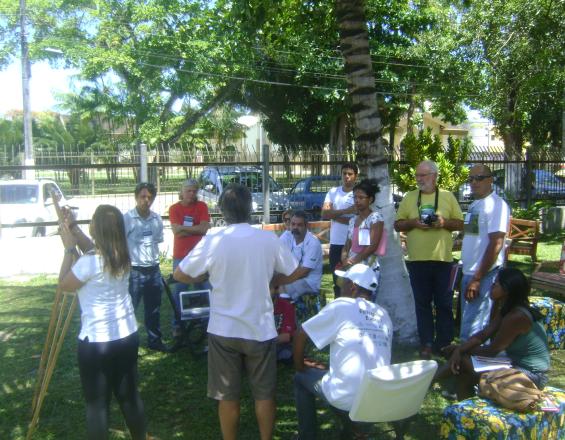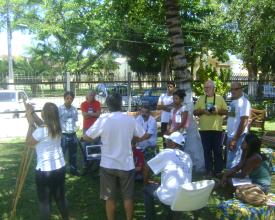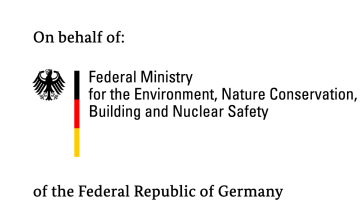Climate sensitive planning
Full Solution

Worskshop participants.
Conservation International
Coastal ecosystems and coral reefs are strongly connected by physical and biological drivers, and are extremely important for climate change adaptation strategies. This solution presents participatory development of a plan for the restoration of the Atlantic Forest in the Porto Seguro Municipality, Brazil, using Ecosystem-based Adaptation and Coastal-Reef connectivity strategies to reduce the vulnerability of coastal communities and the ecosystems they use.
Last update: 08 Feb 2023
6009 Views
Context
Challenges addressed
• Unsustainable use of natural resources.
• Need for ecosystem restoration actions and priorities focusing on Ecosystem-based Adaptation and Coastal-Reef Connectivity approaches to positively impact coastal ecosystems and coral reef conservation, and to reduce communities´ vulnerability to climate change.
• Climate change effects: increase of wave action, storms, sea level changes.
• Effective policies are needed to implement indentified priorities.
• Outreach is needed.
Location
Brazil
South America
Process
Summary of the process
The Municipal Plan for the conservation and restoration of the Atlantic Forest of Porto Seguro, was built using a participatory approach and added technical innovation by including Ecosystem-based Adaptation and Coastal-Reef Connectivity. Experts in these issues participated during all the process and used storylines as awareness tools to adapt the EbA and Connectivity concepts to the context of the region. The activities proposed in the Municipal Plan were based on a regional Climate Change Vulnerability Assessment, previously built for the region. The Plan is now being included in the Porto Seguro Municipal Legislation, by the local deputies and the solution is a model methodology for developing this kind of Municipal Plan, which is being used by partners to build new plans for nine other municipalities in the region.
Building Blocks
Legislation for Municipal Restoration Plans
The Municipal Plans for the Conservation and Restoration of the Atlantic Forest is a Brazilian Policy instituted by the Law of the Atlantic Forest (Law 11.428/06). As they are required for all Brazilian Municipalities under the Atlantic Forest biome, it is a big opportunity to develop new methodologies, and replicate to other municipalities. The experience presented here is part of the case study "Plano Municipal de Conservação e Recuperação da Mata Atlântica de Porto Seguro – Bahia". The process followed the guidelines proposed by the Brazilian Ministry of Environment and GIZ, that recommends the process to be participatory, and technically supported.
Enabling factors
• National legislation previously available;
• Interest from local municipality and stakeholders to develop the Restoration Plan;
• Technical expertise available during the whole process.
Lesson learned
• The mobilization phase was critical for improving the interest of various stakeholders in participating in the development of the Municipal Plan. Dedicated staff presented the proposal and stressed the importance of the process.
• Having the participation of multiple sectors was critical for a comprehensive view of the different ecosystems and activities analyzed.
• Only a few Municipality Secretariats have participated in the process. Having a broader participation from the local government would improve the process.
Climate Change Vulnerability Assessment
One of the first products of the project "Ecosystem-based Adaptation in marine, terrestrial and coastal regions as a means of improving livelihoods and conserving biodiversity in the face of climate change" in Abrolhos was a regional Climate Change Vulnerability Assessment, built with a participatory approach. To produce the assessment, collaborators conducted a series of studies to improve the knowledge base of climate change impacts in the region. They worked with two extreme scenarios, one dry and one wet. The results of these studies, together with other relevant science, formed the basis for expert identification of major climate change impacts and adaptation responses. During a final workshop involving specialists and stakeholders of multiple sectors, the participants built storylines and identified the most vulnerable areas considering social and ecological aspects. The Ecosystem-based Adaptation activities proposed in the Municipal Plan were based in the results of this analysis.
Enabling factors
• The regional Climate Change Vulnerability Assessment was available when the Municipal Restoration Plan was started;
• Vulnerability Assessment was built with a participatory approach, and was known and recognized by local stakeholders.
Lesson learned
Background information about climate change effects, such as the regional vulnerability analysis, is critical to change EbA activities into policy.
Awareness raising storylines
The Municipal Plans for the Conservation and Restoration of the Atlantic Forest are normally focused on restoring biological connectivity for maintaining biodiversity conservation. In this solution, two additional principles were added: Ecosystem-based Adaptation and Coastal-Reef Connectivity. To deal with these complex concepts, experts used storylines as awareness tools for the planning process. A storyline is composed by the main cascading impacts of climate change, and how the impacts in one component will affect the others. Five main storylines were developed for the region: (1) Impacts of climate change on the Brazil current, affecting upwelling patterns, benthic production and fisheries; (2) Impacts of climate change on sedimentation in rivers and reefs and in tourism and fisheries; (3) Impacts of climate change on wave dynamics and coral reefs, affecting erosion and sedimentation, causing impacts in estuaries and tourism; (4) Impacts of climate change on forest fragmentation and fire, causing loss of biodiversity and changes in species distribution; and (5) Impacts of climate change on river flow and saline water intrusion, affecting biodiversity.
Enabling factors
• The participants were informed about the importance of EbA and Coastal-Reef Connectivity in the beginning of the process;
• Technical expertise was available to support decision during all process;
• The final recommendations and activities were revised by the experts.
Lesson learned
• The availability of technical staff was critical to support the decision process maintaining the focus on Ecosystem-based Adaptation and on Coastal-Reef Connectivity;
• Even complex technical issues such as EbA and Coastal-Reef Connectivity can be easily assimilated by local stakeholders with simplified explanations and examples, in this case represented by storylines. The plan received very good contributions from the stakeholders on both issues.
Joint adaptation planning
The Municipal Plan of Porto Seguro, was built in a participatory approach, under the governance of the Municipal Council for the Environment. This council is composed by representatives from the local and state government, local communities, NGOs, and the tourism sector. More than 120 people from different sectors participated in the workshops and meetings providing diverse collaborations, identifying local threats and opportunities, and proposing specific activities based on the knowledge they had about the region. The Municipal Council revised and approved the final plan that was then published and publically distributed. The co-management building approach is now being implemented for other Municipal planning, and being used as a reference for building the Plans for the Conservation and Restoration of the Atlantic Forest in nine other neighbor municipalities.
Enabling factors
• The process was participatory from the beginning;
• The governance system was clearly defined (Municipal Council for the Environment).
Lesson learned
• The mobilization phase was critical for improving the interest of various stakeholders in participating in the development of the Municipal Plan. One staff person has dedicated one month to this, presenting the proposal and stressing the importance of the process.
• Having the participation of multiple sectors was critical for a comprehensive view of the different ecosystems and activities analyzed.
• Just a few Municipality Secretariats have participated in the process. Having a broader participation from the local government would improve the process.
Impacts
• Social: The coastal communities of Porto Seguro Municipality - especially those more vulnerable to climate change effects - now have an Ecosystem-based Adaptation plan and a local policy to implement it.
• Ecological: Local policies for the conservation and restoration of coastal forests, estuaries and coral reef ecosystems were formally stated. In the end of the planning phase, 34 of the 89 activities proposed in the plan were related to Ecosystem-based Adaptation, and 17 to Coastal-Reef connectivity. This was the first Municipal Atlantic Forest Plan in Brazil integrating these themes, and the experience can be replicated to a number of municipalities along the Brazilian coast.
Beneficiaries
The coastal communities, local governments, tourists, and the urban population.
Story
The development of the Municipal Atlantic Forest Plan of Porto Seguro occurred during Brazilian summer, when the temperature was reaching to 36°C. The meeting rooms for the workshops were incredibly hot! The group then decided to move the discussions to the gardens, in the shade of a big tree, where the temperature was much better. It was considered the first practical Ecosystem-based Adaptation activity of the program by the participants, even if in a very small scale!


